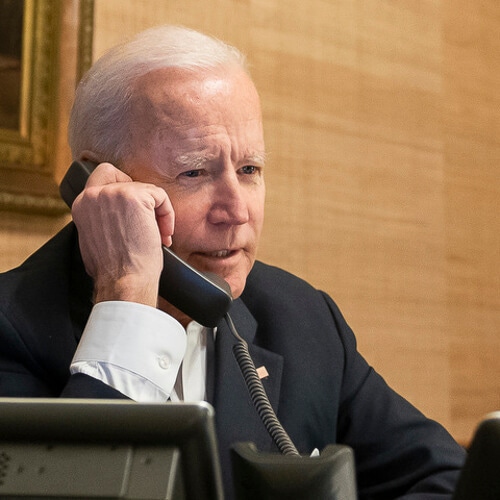Biden starts a list of 59 Chinese companies, including China Mobile and Huawei, that US investors will now have a year from August to divest from.

President Joe Biden on Thursday issued an investment ban list of 59 Chinese companies, including such well-known telecoms names as China Mobile, China Telecommunications, China Unicom and Huawei. It certainly casts aside any lingering doubt where he stands on China.
The executive order gives US investors a year from August 2 to divest their holdings in the companies, which Biden says are linked to China's defense or surveillance industries.
Figure 1:  Busy signal: US President Joe Biden is busy expanding the China naughty list to include 59 companies whose calls he won't be taking.
Busy signal: US President Joe Biden is busy expanding the China naughty list to include 59 companies whose calls he won't be taking.
(Source: White House)
It is the latest move from an administration that, on China, increasingly regards its predecessor as right in principle, wrong in execution. Accordingly, it extends the scope of a Trump order which the Biden administration says was legally flawed.
Some courts have agreed.
In May, a US judge struck down the Trump administration's blacklisting of Chinese mobile phone manufacturer Xiaomi, accepting the company's arguments that the previous administration had acted illegally.
Every step you make
The order also focussed especially on Chinese surveillance technology, being used both inside and outside the country "to facilitate repression or serious human rights abuse." These developments "constitute unusual and extraordinary threats," said Biden in the order.
Though the US would seek to act multilaterally with its allies, relations with China would be characterized by competition, with the era of engagement being over, White House officials now say. And the ban list would be a "rolling" one, to which new companies will be added in coming months, they indicate.
It also included Semiconductor Manufacturing International Corp (SMIC), mainland China's largest semiconductor foundry and linchpin of its hopes to revive the country's chip industry.
Chinese whispers
Biden's order also cleared up some confusion from Trump's list, involving whether the ban also applies to the companies' subsidiaries.
Subsidiaries will only be included in the order if they are explicitly listed in the Office of Foreign Assets Control's list.
The agency, part of the US Department of the Treasury, will coordinate the list in consultation with the Departments of State and Defense.
Biden's hand, to some extent, was forced by legislation. Last year's Defense Authorization Act had required the administration to publish a new list of Chinese military-affiliated entities, which had been due on April 15.
On Capitol Hill, Arkansas Republican Senator Tom Cotton said this week that allowing "Chinese military companies" to have access to US capital markets amounted to "arming and funding our leading competitor."
Whereas on the other side, the ban harms "the legal rights and interests of the Chinese companies and also the interests of global investors, including the American ones," said Chinese Foreign Ministry spokesman Wang Wenbin.
A Biden in a China shop
American businesses are not universally happy about the new mood music of continued trade war and economic decoupling between China and the US.
Over 3,500 US companies, including Ford, Coca-Cola and Disney, have filed lawsuits against the government over tariffs on Chinese imports imposed by Trump and remaining in place under Biden.
Want to know more about security? Check out our dedicated security channel here on
Light Reading.
The New York-based US Court of International Trade will begin hearings on these cases in coming months.
US trade representative Katherine Tai, the administration's top trade official, has come under pressure to reinstate an expired mechanism allowing US companies to apply for exceptions to these Section 301 tariffs.
But with 2022's midterm congressional elections already rearing their head, the Biden White House is reluctant to take any China moves which would allow Republicans to characterize his party as soft on China.
Related posts:
— Pádraig Belton, contributing editor special to Light Reading
Read more about:
AsiaAbout the Author(s)
You May Also Like











